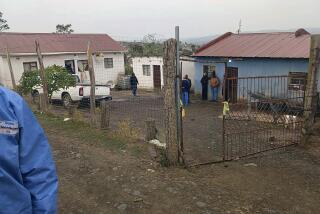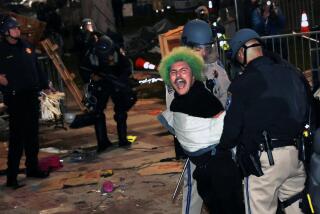20 Die as Unrest Invades Urban South Africa
- Share via
JOHANNESBURG, South Africa — Fierce gun battles and other political violence raged in skyscraper-lined streets here Monday, turning the commercial heart of the country’s most important city into an urban war zone a month before democratic elections.
The downtown shooting sprees, which left at least 20 people dead and scores wounded, erupted after thousands of spear-carrying Zulu nationalists marched and danced through the central business district to protest South Africa’s first all-race elections and to demand a sovereign Zulu state.
The day’s carnage was an ominous turning point in the bloodstained march from apartheid to democracy. The chaos marked the first time that the ethnic fighting and political terror that have ravaged impoverished black townships for years have spread into downtown Johannesburg and paralyzed the bustling center of Africa’s strongest economy.
At least eight Zulus were shot to death and nine were wounded in a narrow street beside the headquarters of Nelson Mandela’s African National Congress. ANC spokesmen said security guards had fired into the crowd from ground level to stop them from storming the office. But witnesses said the protesters were only marching by when at least three ANC guards opened fire from a first-floor balcony.
Shortly afterward, police said, a wild 20-minute gun battle erupted in a small park in front of the main library, where thousands of Zulus had massed.
Confused police and numerous marchers fired pistols and assault rifles in all directions after shots seemed to come from a sniper in a high-rise tower, and the rattle and boom of warfare echoed down the glass and concrete canyons.
Three other people were shot to death at the Carlton Center, an upscale shopping mall under a well-known luxury hotel. And one man’s horrible death was grimly recorded for television when he was repeatedly hit in the head with a brick as a mob cheered.
The midday, mid-town violence clearly showed how explosive South Africa remains, despite four long years of preparations and negotiations for the April 26-28 elections to finally end white minority rule and inaugurate a government elected by the long disfranchised black majority.
President Frederik W. de Klerk and ANC spokesmen said they deplored the nightmarish scenes of violence but insisted that the election would not be delayed despite the demands of the Inkatha Freedom Party, which organized the march.
“There can be no excuse at this critical stage in the political process for provocative and potentially violent actions, such as we have seen today,” De Klerk said in a statement. “It not only endangers the elections and reform process, but the very fabric of society.”
A European peace monitor who witnessed the shooting was even more pessimistic. “This is just the start,” he said. “Now it gets very bloody.”
ANC regional leader Tokyo Sexwale also warned that the day presaged further violence. “Our information is (that) a similar type of operation will take place shortly before the election so the voting can be declared null and void,” he said.
Rivalries between ANC and Inkatha factions, fueled by ethnic tensions between Xhosas and Zulus, the two largest tribes, were blamed for 4,000 deaths last year. According to a recent judicial report, at least some of the Zulus were armed by police officials aiming to destabilize the country to prolong white rule.
The shooting here mirrored an upsurge in violence in Natal province, the Zulu stronghold, where Inkatha and ANC-supporting Zulus have stepped up a low-level war. More than 150 people have been killed in the last 10 days.
Hundreds of Natal-based Zulus were bused into the black townships around Johannesburg over the weekend to attend the march and rally. More than a dozen people were reported killed and more than 200 wounded in the townships overnight and early today around the workers’ barracks where the Zulus are concentrated.
According to witnesses and reports here, marauding groups of Zulus abducted passengers from minivans used as taxis, fired on passing commuter trains, bombed an ANC office and burned homes, shops and vehicles in tense townships across Soweto and the East Rand. More violence was expected in response to the day’s shootings.
The first groups of armed Zulus began parading in downtown Johannesburg by 7:30 a.m., chasing pedestrians, tearing up ANC posters and menacing drivers. Marchers presented a fierce image: Most carried painted goatskin shields, waved spears or clubs and wore headgear made of leopard pelts.
Thabo Mbeki, ANC national chairman, told a news conference that senior police officials had agreed Sunday afternoon to set up roadblocks to keep armed protesters from approaching the ANC offices. “Clearly the roadblocks were not set up,” he said.
Mbeki said party leaders had repeated calls to police early Monday after shots were fired at people entering the ANC building. He said a squad of 10 officers arrived but fled and did not return when another group of protesters waving spears and clubs approached and ANC security men fired into the air.
The group approached for a third time, led by a man carrying an AK-47 rifle, “with the obvious intent of storming the ANC head office,” Mbeki said. At that point, he said, the ANC guards “fired into the advancing group.”
He specifically denied witnesses’ claims that several guards had fired down from a concrete balcony that overhangs the street. But bullet holes and fresh gouges in the balcony suggested that those in the crowd were firing upward.
Mbeki stopped short of accusing the police of supporting the protesters. “It is difficult to understand, given all these warnings, why nothing was done,” he said. “It suggests a little bit more than incompetence.”
But few police were on hand when several thousand Zulus gathered near an obelisk in the Library Gardens about noon. They marched up and down the street in no apparent order, beating their shields with small spears and leaping in the air. One man, wearing a clown’s red wig, waved a long asagai (machete), while another in a Wayne’s World cap pounded the pavement with an iron rod.
Most shops and office buildings were already closed, behind steel shutters. Nearby streets were deserted. “We want our country,” they chanted in Zulu.
Suddenly, at 12:20 p.m., gunfire seemed to come from the back of the City Hall. First one shot. Then another. Then a long, loud burst. As the crowd scattered or dived to the ground in panic, a fusillade of answering gunfire began to echo and roar on all sides. A policeman, shot in the chest, fell in the street. He and other wounded were soon carried to safety.
Windows in at least two nearby office buildings were smashed by gunfire from the ground, but squads of police pointed and fired in several directions as the echoes made it impossible to determine the source of the shooting
At one point, they fired flash grenades into the park, presumably to force the crowd to flee the open ground and seek safety under nearby buildings. Scores ran, or scrambled like crabs.
“There were definitely people shooting from the buildings,” said police Brig. Gen. Buks Meintjes, moments after the firing stopped.
Beside him, a Zulu man lay dead. Meintjes said the police had killed him after they saw him firing an assault rifle into the upper windows of Custom House, a nearby office building. Other bodies lay in the street and beside a building. Hundreds of shoes littered the square, lost by members of the fleeing crowds.
The Zulus insisted that ANC security men had fired upon them, although they had not actually seen them. “We were just talking and they just started shooting into the crowd,” said Moses Mzulu, 35.
Police finally arrived in force after the shooting, moving reinforcements into the city in rumbling convoys of armored vehicles. By nightfall, soldiers in combat gear patrolled the deserted streets.
More to Read
Sign up for Essential California
The most important California stories and recommendations in your inbox every morning.
You may occasionally receive promotional content from the Los Angeles Times.














